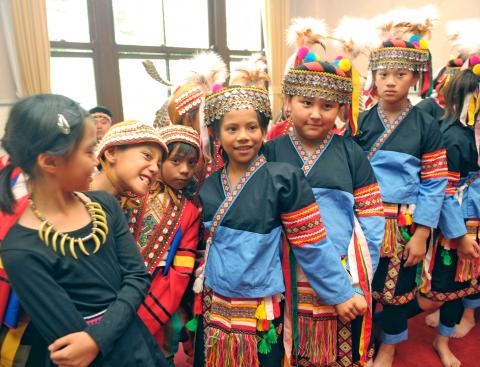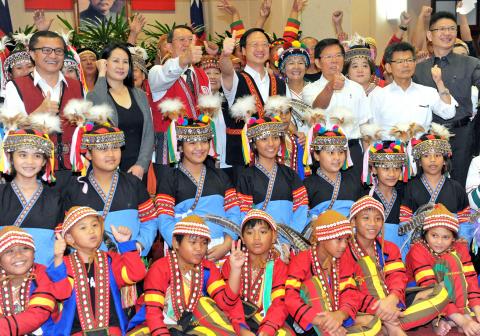The Executive Yuan yesterday approved a move to add two more groups — the Kanakanavu (卡那卡那富) and Hla’alua (拉阿魯哇) people — to the nation’s 14 officially recognized Aborigine groups.
Hailing from mountain villages in southern Taiwan, Kanakanavu people and Hla’alua people are mainly based in Greater Kaohsiung’s Namasiya Township (那瑪夏) and Taoyuan District (桃源) respectively.
The official recognition was welcomed with traditional celebrations, cultural dances and music in a ceremony at the Executive Yuan in Taipei yesterday.

Photo: CNA
Kanakanavu people, who number about 600, and Hla’alua people, numbering about 500, have smaller populations than the nation’s major Aborigine groups.
An official at the Council of Indigenous Peoples said these groups were previously classified as Tsou (鄒) people, but their languages, cultural traditions and ritual ceremonies differ from those of the Tsou.
An assessment study undertaken by researchers at National Chengchi University’s Center for Aboriginal Studies indicated that the two groups each had their own cultural characteristics and ethnic identities, and therefore should be recognized as two distinct Aborigine groups.

Photo: CNA
An earlier, traditional classification held that the nation is home to the so-called “nine mountain Aborigine groups” — the Amis, Atayal, Puyuma, Bunun, Paiwan, Rukai, Saisiyat, Tsou and Yami peoples.
Since 2001, the government has recognized five more Aboriginal peoples: the Thao, Kavalan, Truku, Sakizaya and Sediq.
However, the government has excluded 10 lowland Pingpu Aborigine groups from official recognition, activists have said.
Despite decades of struggle for Aboriginal rights and their lobbying efforts, the government still denies recognition to the Pingpu groups of Babuza, Hoanya, Kaxabu, Ketagalan, Makatao, Pazeh, Papora, Siraya, Taokas and Tavorlong.

Alain Robert, known as the "French Spider-Man," praised Alex Honnold as exceptionally well-prepared after the US climber completed a free solo ascent of Taipei 101 yesterday. Robert said Honnold's ascent of the 508m-tall skyscraper in just more than one-and-a-half hours without using safety ropes or equipment was a remarkable achievement. "This is my life," he said in an interview conducted in French, adding that he liked the feeling of being "on the edge of danger." The 63-year-old Frenchman climbed Taipei 101 using ropes in December 2004, taking about four hours to reach the top. On a one-to-10 scale of difficulty, Robert said Taipei 101

Nipah virus infection is to be officially listed as a category 5 notifiable infectious disease in Taiwan in March, while clinical treatment guidelines are being formulated, the Centers for Disease Control (CDC) said yesterday. With Nipah infections being reported in other countries and considering its relatively high fatality rate, the centers on Jan. 16 announced that it would be listed as a notifiable infectious disease to bolster the nation’s systematic early warning system and increase public awareness, the CDC said. Bangladesh reported four fatal cases last year in separate districts, with three linked to raw date palm sap consumption, CDC Epidemic Intelligence

Taiwanese and US defense groups are collaborating to introduce deployable, semi-autonomous manufacturing systems for drones and components in a boost to the nation’s supply chain resilience. Taiwan’s G-Tech Optroelectronics Corp subsidiary GTOC and the US’ Aerkomm Inc on Friday announced an agreement with fellow US-based Firestorm Lab to adopt the latter’s xCell, a technology featuring 3D printers fitted in 6.1m container units. The systems enable aerial platforms and parts to be produced in high volumes from dispersed nodes capable of rapid redeployment, to minimize the risk of enemy strikes and to meet field requirements, they said. Firestorm chief technology officer Ian Muceus said

MORE FALL: An investigation into one of Xi’s key cronies, part of a broader ‘anti-corruption’ drive, indicates that he might have a deep distrust in the military, an expert said China’s latest military purge underscores systemic risks in its shift from collective leadership to sole rule under Chinese President Xi Jinping (習近平), and could disrupt its chain of command and military capabilities, a national security official said yesterday. If decisionmaking within the Chinese Communist Party has become “irrational” under one-man rule, the Taiwan Strait and the regional situation must be approached with extreme caution, given unforeseen risks, they added. The anonymous official made the remarks as China’s Central Military Commission Vice Chairman Zhang Youxia (張又俠) and Joint Staff Department Chief of Staff Liu Zhenli (劉振立) were reportedly being investigated for suspected “serious